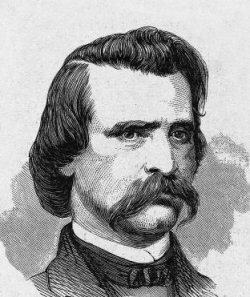| Nicknamed
"Black Jack" or "Black Eagle" as an adult, John Logan was born in
Jackson County, Illinois, the eldest of eleven children. His father, a Scotch-Irish
immigrant from northern Ireland, was a physician. Young Logan interrupted his legal
studies to serve in the Mexican-American War as a lieutenant. After the war, he resumed
the study of law, and practiced it for a few years before being elected to the Illinois
legislature. A Douglas Democrat, Logan was elected to Congress in 1858 while taking a
stance against the Lecompton constitution of Kansas, which denied the Northern Democratic
position of popular sovereignty on the slavery issue. He represented the southern Illinois
district sometimes called "Little Egypt." In 1860, Logan supported Douglas for
president and was himself reelected to Congress. When the Civil War began, Logan joined
the Union fight, first at the Battle of Bull Run, then returning to Illinois to become
colonel in the 31st Illinois Regiment. After Fort Donelson, he was promoted to
brigadier-general, and after Vicksburg, he was named a major-general. He eventually became
commander of the Army of the Tennessee, but was removed from that position by President
Lincoln at General Sherman’s request. Logan believed this was due to West Point
prejudice against a volunteer. Sherman argued that Logan’s political activities took
him from the field and that, although a tough fighter, he expressed contempt for
logistical preparations. Despite his distinguished military record for the Union, Logan
would have to face rumors of his Confederate sympathy for the rest of his life. After the
war, he helped found the Society of the Army of the Republic and originated the idea of
Memorial Day.
In 1866, he was reelected to Congress as a Republican, and was selected as one of the
House managers (prosecutors) of impeachment charges against President Johnson during the
removal trial in the Senate. After being reelected twice, Logan was chosen to represent
Illinois in the U.S. Senate in 1871. He lost the seat in 1877 to David Davis, but gained
the other Illinois Senate seat in 1879. A supporter of Grant’s unsuccessful bid for a
third term in 1880, Logan was himself nominated for Vice President on the Republican
national ticket with Presidential nominee James Blaine in 1884. He was returned to the
Senate in 1885. In his final years, Logan worked on two military books, The Great
Conspiracy: Its Origin and History (1886) and the posthumously published The Volunteer
Soldier of America, With a Memoir of the Author and Military Reminiscences from General
Logan’s Private Journal (1887). He died in Washington, D. C.
Robert C. Kennedy, HarpWeek
Source consulted: Dictionary of American Biography |
|

John Alexander Logan
(9 February 1826 - 26 December 1886)
Source: Harper's Weekly
|